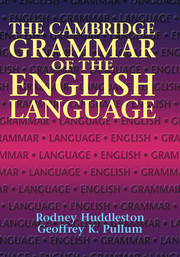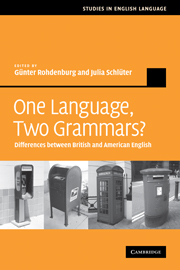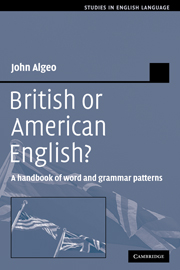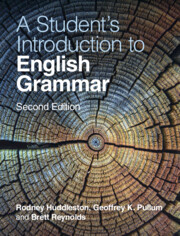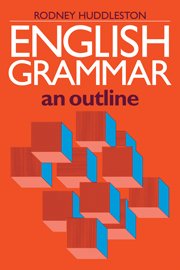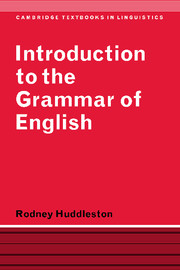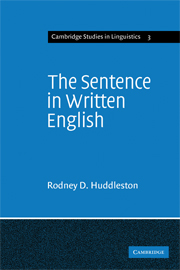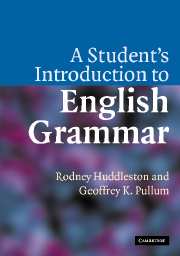The Cambridge Grammar of the English Language
This book presents a new and comprehensive descriptive grammar of English, written by the principal authors in collaboration with an international research team of a dozen linguists in five countries. It represents a major advance over previous grammars by virtue of drawing systematically on the linguistic research carried out on English during the last forty years. It incorporates insights from the theoretical literature but presents them in a way that is accessible to readers without formal training in linguistics. It is based on a sounder and more consistent descriptive framework than previous large-scale grammars, and includes much more explanation of grammatical terms and concepts, together with justification for the ways in which the analysis differs from traditional grammar. The book contains twenty chapters and a guide to further reading. Its usefulness is enhanced by diagrams of sentence structure, cross-references between sections, a comprehensive index, and user-friendly design and typography throughout.
- The definitive grammar for the new millennium, written by an international team of more than a dozen linguists and spanning a decade of research
- It is firmly based on research in modern linguistics and rejects many errors of the older tradition, supporting its departures from traditional grammar with reasoned argument
- It emphasises the clear explanation of grammatical terms; the user-friendly layout, consistent terminology and comprehensive index all ensure ease of access for non-specialists
Reviews & endorsements
"With help from an impressive group of international scholars, linguistics professors Huddleston (English Grammar: An Outline) and Pullum (Phonetic Symbol Guide) here provide a comprehensive and detailed look at the principles of the English language...[A]n authoritative addition to the fields of both English grammar and linguistics. Recommended for all academic libraries." Library Journal
"The Cambridge Grammar of English manages to be at once authoritative, sensible and readable. It provides what the standard usage and style manuals lack, and an understanding of how English grammar as a whole works, and of what the facts of usage really are." Terry Langendoen, Professor of Linguistics at the University of Arizona, past President of the Linguistic Society of America, and former Chair of the Linguistics and Language Sciences section of the American Association for the Advancement of Science
"Everything about this book is a credit to the authors and the publishers. It is authoritative, interesting, reasonably priced (for a book of this size), beautifully designed, well proofread, and enjoyable to handle.... It is both a modern complement to existing descriptive grammars and an important resource for anyone interested in working with or finding out about English.... a very complete and convincing demonstration that the ideas of modern theoretical linguistics can be deployed in the detailed description of a particular language.... this book is as appropriate for the formally trained linguist wishing to broaden the range of data that a theory covers as for the software engineer wishing to augment NLP skills with a more serious understanding of how the language works." Computational Linguistics
"[A]n authoritative addition to the fields of both English grammar and linguistics. Recommended for all academic libraries." Library Journal
"Sets new standards, informed by the achievements of both traditional and formal grammatical studies." Bernard Comrie
"In English grammar-writing it begins a new epoch." Aimo Seppanen, University of Gotenberg
"A notable achievement. No other grammar of English is at once as comprehensive and as systematically and lucidly informed by present-day linguistic theory. I see it as an essential work of reference." Peter Matthews, Professor of Linguistics, University of Cambridge
"The Cambridge Grammar of the English Language is one of the most superb works of academic scholarship ever to appear on the English liguistics scene. This was a magnificent team effort, spanning more than ten years. Together these linguists have produced a monumental work that offers easily the most comprehensive and thought-provoking treatment of English grammar to date. Nothing rivals this work, with respect to breadth, depth and consistency of coverage." Australian Book Review
"The Cambridge Grammar of English is for the 21st century what Jespersen's A Modern English Grammar, and Quirk, Greenbaum, Leech and Svartvik's A Contemporary English Grammar were for the 20th." Terry Langendoen, Professor of Lingustics at the University of Arizona
"One admires at once its great scope and the authors' scrupulous attention to detail.... Within its school, the prevailing one presently, this grammar is unquestionably the authoritative resource." Choice
Product details
April 2002Hardback
9780521431460
1860 pages
257 × 183 × 72 mm
3.1kg
Available
Table of Contents
- 1. Preliminaries Geoffrey K. Pullum and Rodney Huddleston
- 2. Syntactic overview Rodney Huddleston
- 3. The verb Rodney Huddleston
- 4. The clause, I: mainly complements Rodney Huddleston
- 5. Nouns and noun phrases John Payne and Rodney Huddleston
- 6. Adjectives and adverbs Geoffrey K. Pullum and Rodney Huddleston
- 7. Prepositions and preposition phrases Geoffrey K. Pullum and Rodney Huddleston
- 8. The clause, II: mainly adjuncts Anita Mittwoch, Rodney Huddleston and Peter Collins
- 9. Negation Geoffrey K. Pullum and Rodney Huddleston
- 10. Clause type and illocutionary force Rodney Huddleston
- 11. Content clauses and reported speech Rodney Huddleston
- 12. Relative clauses and unbounded dependencies Rodney Huddleston, Geoffrey K. Pullum and Peter G. Peterson
- 13. Comparative constructions Rodney Huddleston
- 14. Non-finite and verbless clauses Rodney Huddleston
- 15. Coordination and supplementation Rodney Huddleston, John Payne and Peter G. Peterson
- 16. Information packaging Gregory Ward, Betty Birner and Rodney Huddleston
- 17. Deixis and anaphora Lesley Stirling and Rodney Huddleston
- 18. Inflectional morphology and related matters F. R. Palmer, Rodney Huddleston and Geoffrey K. Pullum
- 19. Lexical word-formation Laurie Bauer and Rodney Huddleston
- 20. Punctuation Geoffrey Nunberg, Ted Briscoe and Rodney Huddleston
- Further reading
- Index.

